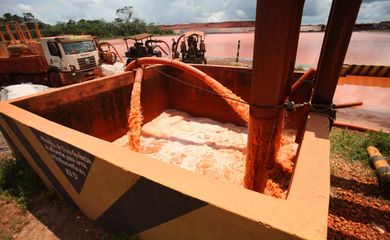Norway mining giant apologizes for toxic leak


The state’s Secretary for Environment and Sustainability found a connection between the rainwater ducts from the coal warehouse to the draining system from the aluminum plant nearby, Albras, which goes as far as the Pará river. 

Norwegian mining company Hydro Alunorte apologized to the population of Barcarena (a town outside Belém, capital of the northern state of Pará), and decided to expand the reassessment of water treatment and effluent management systems throughout the area comprised by the refinery, after the mining giant was once again indicted for spillage of toxic waste into the Pará river.
“We have discharged untreated rain water as well as surface water from the refinery into the Pará river. This is unacceptable and goes against what Hydro believes in. On behalf of the company, I apologize to the communities, authorities, and society,” said company CEO Svein Richard Brandtzæg in a note.
The state’s Secretary for Environment and Sustainability once again charged the mining firm last Thursday (Mar. 15) after inspectors found a connection between the rainwater ducts from the coal warehouse to the draining system from the aluminum plant nearby, Albras, which goes as far as the Pará river. According to the authorities, part of the rain water collecting in area belonging to Hydro Alunorte was discharged outside by means of this clandestine connection without being sent to the industrial effluent treatment system, as mandated by law, which stipulates that, even if the material spilled is not production waste, it must be treated, as it may be contaminated.
“This shows how important a thorough revision by Alunorte is, including operation interfaces with adjacent areas and the situation concerning the license of the plant in order to check the full compliance of licenses. We need full understanding so that we can take the necessary action,” Brandtzæg added.
Sanctions
Last Thursday’s indictment (15) is the eighth sanction imposed by the state government on the mining giant. One of them orders the company to reduce the level of water in the residue deposits. The total amount of fines imposed was still being calculated last week. After being officially notified, the company will be given a deadline to produce its defense.
Early in February, the firm contracted Brazilian consultancy SGW Serviços to assess the water treatment model and verify whether the refinery’s effluent management system had been operated appropriately. Later on, when allegations emerged regarding irregular water discharge spots, the company decided to expand its auditing efforts in order to cover all possible links between the mining firm and the nearby areas. Furthermore, the internal auditing conducted by Hydro Alunorte itself is expected to review all licenses issued by the relevant agencies to find any noncompliance.
The firm argues that water is no longer pumping and that it is working to find the best way to shut also the connection between the hydrate storage area and the factory next door.
On Friday (16), the company unveiled plans to invest some $64.42 million in the alumina refinery’s water treatment system in Barcarena, expanding the unit’s capacity to withstand extreme climate conditions.
The leak of toxic waste was reported by locals, who noticed color changes in streams and one river from February 16 to 18. Days later, the Evandro Chagas Institute, linked to the Health Ministry, released a preliminary report showing there had been a toxic spill, which posed a risk to the health of local population of at least three nearby communities. Samples collected in the area also revealed high levels of lead, aluminum, sodium, and other substances harmful to human and animal health.
Hydro Alunorte is the employer of approximately 2 thousand people. It is the biggest alumina (aluminum dioxide) in the world, and has a nominal capacity of 6.3 million tons a year. The oxide is produced from the purification of bauxite—which the firm extracts from its own mine in Paragominas, 240 km away from the refinery—and then transformed into aluminum.
Translated by Fabrício Ferreira
Fonte: Norway mining giant apologizes for toxic leak


